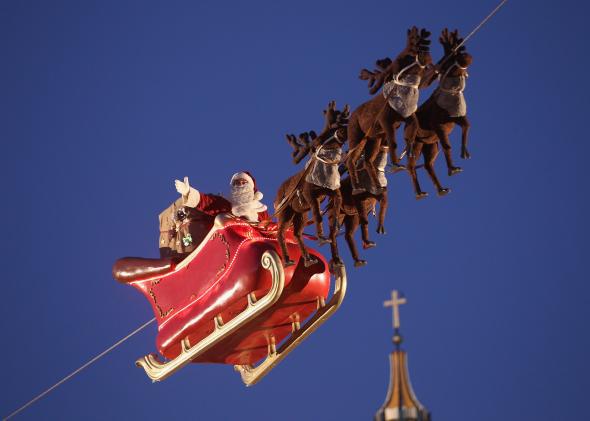When I said in an earlier post discussing how irreligious American Jews are, that my daughter’s observance was an open question, I thought it wouldn’t come up for a while. After all, she’s not even one. My biggest faith-based fear about her this holiday season is that she will knock over a menorah and set our apartment on fire. But that was before my husband and I started talking about the bearded, rotund, elephant in the room: Santa.
I am unabashedly pro-Christmas tree, but Christmas trees don’t necessarily come along with any sort of story. Big tree you decorate pretty, the end. Santa, on the other hand, requires that you tell your children an elaborate lie. It’s not just that I’m reluctant to relate a sweet story about a red-leisure-suit wearing guy who lives for breaking and entering (though as Melinda Wenner Moyer pointed out in Slate, the Santa lie is not destructive for kids). I also don’t love the message of Santa—he only rewards Christian boys and girls. “What are we going to tell her about the other children?” I asked my husband. “Why doesn’t Santa come to their house?”
My husband’s answer: What? And: I’m being ridiculous and overly literal. Santa was a cherished and magical part of his childhood that he’s eager to pass along to the next gen. He believed in Santa until he was 7 or so, and he says he never felt like his parents were lying to him. When it began to dawn on him that Santa wasn’t real, it wasn’t painful or upsetting—it was a natural part of growing up.
After we argued about it for five minutes, I ceded to my husband. Who wants to be the Grinch depriving your kid of wonderment? Also, I checked with a half-Jewish friend about whether or not it bothered her that other Jewish children didn’t get Santa, and she said she grew up understanding that different kids had different kinds of holidays and it didn’t have to be a cruel or exclusionary thing. Which actually makes the whole thing sound like a teachable moment in tolerance—who knew?
Plus, I figure how our daughter responds to Santa will depend on what kind of kid she is. Maybe she’ll be like me—I was always a skeptic: I never bought the tooth fairy. I was always asking plausibility questions and putting enormous little kid air quotes around the whole tooth-for-money transaction. I also suspect my parents didn’t sell the tooth fairy particularly aggressively. My husband’s parents sold Santa moderately hard, but I don’t think they were crushed when their second grader discovered the truth.
You can go too far with these things, as a 2012 episode of This American Life showed. It told the story of a man named Adam Mutchler, who was scarred for life because of his parents’ Santa lie. His parents went so far to sell Santa that they hired some dude to pose as Kris Kringle and show up on their lawn. They had a mythology about a vindictive Christmas elf named Jeko. Adam’s siblings eventually wised up, but Adam believed until he was a teenager, and felt humiliated and angry when he realized his parents were putting him on. He remained furious about it for years. According to This American Life’s reporter, “One year, he came home from college and accused his parents for being the reason he couldn’t trust anyone enough to have a serious girlfriend.”
We don’t have the energy or desire to hire some creepy dude to show up at our apartment pretending to be Santa. I assume I will half-heartedly tell our kid about Santa, because it’s probably harmless (I’ll tell worse lies, right?), and at best a really nice thing for a very young child to have fun with. But now that we’re officially in the holiday season, I’m curious to hear from other interfaith couples or people who were brought up in interfaith households where one parent was Christian. Did your parents sell the Santa lie?
